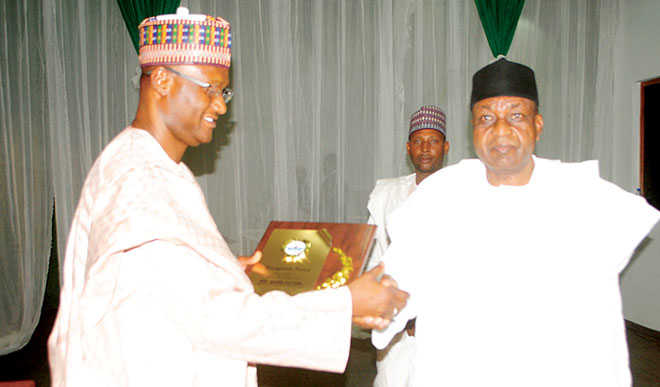Builders Congress: Seeking way forward for building, construction industry
The building and construction industry in the country has been bedeviled by serious challenges in the past ranging from incessant building collapse, quackery, use of substandard materials and production of substandard buildings among others. Stakeholders in the industry last week converged at the International Conference Centre, Abuja during the maiden edition of the 2015 Builders […]


The building and construction industry in the country has been bedeviled by serious challenges in the past ranging from incessant building collapse, quackery, use of substandard materials and production of substandard buildings among others.
Stakeholders in the industry last week converged at the International Conference Centre, Abuja during the maiden edition of the 2015 Builders Congress with the theme “Nigeria Building Industry and National Economy, Synergies and opportunities” organized by the Council of Registered Builders of Nigeria (CORBON) to find ways of repositioning the industry.
The three-day event was supported by the Nigerian Institute of Building (NIOB), Quantity Surveyors Registration Board of Nigeria, and Town Planners Registration of Nigeria and among others.
The stakeholders argued that the industry which has great potential is yet to contribute much to the Gross Domestic Product (GDP) when compared to developed nations hence the need to reposition the industry for greater performance and contribution to the national economy.
In his speech, the Deputy Governor of Bauchi State, Nuhu Gidadu, who is also a builder stressed the need for building professionals to assume the role of coordinator for the construction industry in its bid to reposition the industry.
“Builders are supposed to be the coordinators of the construction industry. We have the Structural and Civil Engineers as well as Architects and Quantity Surveyors in the industry, only the civil professionals are supposed to be the coordinator, because it is the builders that have insight into virtually all the other professional areas but this is not the case,” he said.
According to him, builders have in-depth training in architecture, quantity survey, architecture and structural engineering, adding that with that builders are supposed to play the coordinator role of the construction industry and not just sit behind.
Another speaker, the Corp Marshall, Federal Road Safety Commission (FRSC) Engr. Boboye Oyeyemi stressed the need for professionals in the building industry such as engineers, surveyors, Town Planners among others to synergize and develop ideas and concepts towards meeting the United Nation’s declaration of 2016 to December 2030.
Boboye advised that construction industry should not be left in the hands of quacks as well as those that engage in unwholesome practices like use of substandard materials and deviation from designated materials because a well-constructed road or bridge saves cost of maintenance, lower time spent on travelling and hence contribute to economic growth and wealth distribution.
“Other professionals can hide their mistakes and faults under academic and professional cover but faults and mistakes of a builder are glaring because you cannot hide a failed structure, poorly constructed building, leaking roof or bad fitted plumbing in a building,” he said.
He stressed the need for builders to insist on best international practices, saying that those involved in the design and execution must consider the environmental impact of design, develop a sound management plan which includes site safety, noise and environmental pollution control.
Boboyi who was represented by Assist Corp Marshall Olakunle Motajo, challenged CORBON to initiate programmes and courses that will further exposed its members to modern trends in the building industry and synergise with related professionals to address frequent cases of building collapse.
According to him, infrastructure is indispensable to development targets such as urbanization, industrialization, export promotion, equitable income distribution and sustainable development, saying builders are seen as major players in the infrastructural development and sustenance of national development.
The Permanent Secretary Federal Ministry of Housing and Urban Development, George A. Ossi said building industry being a subset of the construction industry plays significant role in economic development and prosperity of a nation as its products and services have a direct impact on society and influence government capital expenditure on yearly basis.
He said in many nations of the world, building and construction industry is reputed for contributing to the GDP of the national economy but in Nigeria the industry is yet to realize its potential as it contributes little compared to developed nations. The Permanent Secretary identified difficult business environment, dearth of technical expertise, dearth of key building materials and constrained access to credit as the major challenges confronting the industry.
He pointed out that incidence of building collapse and little patronage of indigenous contractors by government and private organisations especially for major building and infrastructural development do not portray a good image for the industry.
“Poor quality of work done by the few patronized indigenous construction firms also make it the worse,” he said.
Ossi lamented that most of the contracts awarded to indigenous firms were done as a means of guaranteeing political patronage and in most cases were executed by quacks, saying that it requires the effort of all stakeholders to turn things around.
In his welcome address, CORBON Chairman, Prof. Kabiru Bala said the congress was organized to unmask the synergies and opportunities in the building industry as well as prove a platform for public private sector players in the built environment to harness ideas and solutions for building projects delivery.
While appealing to stakeholders to partner with the council to enable the building industry contribute to the GDP, he lamented that the council had received only N7.5 million in two years which he said hindered regulatory and other activities of the council.
In his good will message, the president Quantity Surveyors Registration Board of Nigeria (QSRBN) Mallam Hussaini Dikko said the quantity surveyor needs to move beyond the basic certificate qualification and commended the council for organizing the congress.
